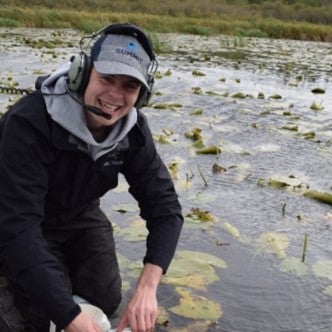Waterloo’s PhD programs are scholarly and rigorous in terms of theoretical sophistication and depth and breadth of knowledge. But the University’s spirit of innovation calls on PhD students to disrupt and challenge the status quo.
Mitchell Kay completed his doctorate with Prof. Roland Hall through the Department of Biology, specifically within the specialized Collaborative Water Program through the Water Institute.

His research helped establish a baseline to measure the impact of major industry projects on water quality and quantity in the Peace-Athabasca Delta, in northern Alberta.
“My PhD research developed and applied paleolimnological approaches in the Peace-Athabasca Delta to provide critically missing long-term information on contaminant deposition and drivers of hydroecological change via analysis of lake sediment cores,” Kay says.
The Peace-Athabasca Delta is the world’s largest boreal freshwater delta and contained within Wood Buffalo National Park, one of Canada’s 20 UNESCO World Heritage Sites.
For the past 50 years, there have been many unresolved concerns over the potential effects of major energy projects, climate change and reduced river discharge on lakes in the delta.
Because the research essentially provides a window on the past, Kay describes his PhD research “as a form of time travelling.”
He takes sediment cores from lakes located in northern Alberta right on the boarder of the Northwest Territories. From that, we're able to reconstruct what the conditions were like a hundred, two hundred, three hundred, sometimes up to thousands of years ago and allow us to create baseline conditions for what the range of natural variation is for this system.
His research found natural environmental processes—not upstream energy projects—are the primary cause of changing flood patterns in Alberta’s Athabasca Delta.
After completing his doctoral research, Kay has taken up an NSERC Postdoctoral Fellowship at McGill University in Montreal, where he is keen to continue his scholarly work. But having also done his undergrad studies at Waterloo, Kay says Waterloo will always be a special place for him.
“The University of Waterloo is full of people who want you to succeed and accomplish all your goals,” he says. “There is always someone willing to help no matter how big or small the problem, and they do it with a smile.”